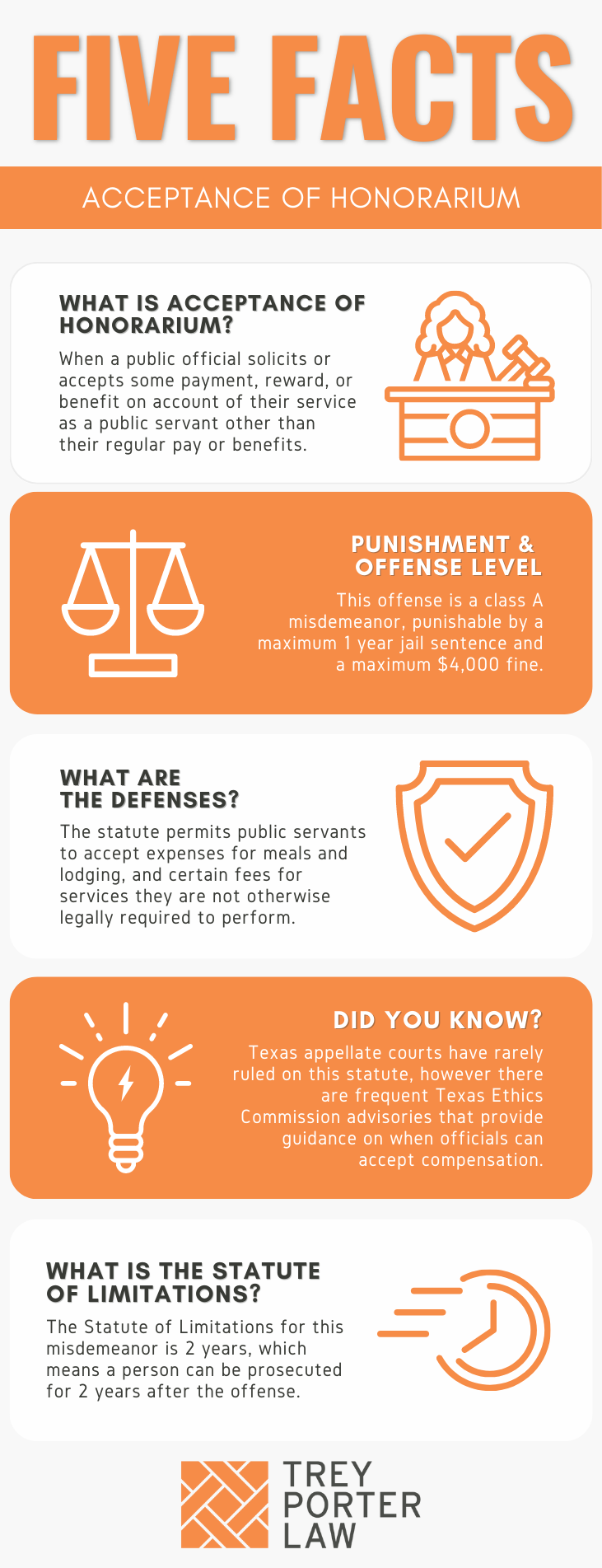WHAT IS ACCEPTANCE OF HONORARIUM IN TEXAS?
The Texas law against acceptance of honorarium prohibits public servants, including judges, legislators, and police officers, from accepting honoraria for their services as public servants.

- What is an “honorarium”? An honorarium includes a payment or reward, usually in recognition of services on which custom or propriety forbids any fixed business price to be set. It may be a free gift or gratuitous payment, as well as compensation. The term “benefit” encompasses “honorarium.”
WHAT IS THE ACCEPTANCE OF HONORARIUM LAW IN TEXAS?
Tex. Penal Code § 36.07. ACCEPTANCE OF HONORARIUM.
(a) A public servant commits an offense if the public servant solicits, accepts, or agrees to accept an honorarium in consideration for services that the public servant would not have been requested to provide but for the public servant’s official position or duties.
(b) This section does not prohibit a public servant from accepting transportation and lodging expenses in connection with a conference or similar event in which the public servant renders services, such as addressing an audience or engaging in a seminar, to the extent that those services are more than merely perfunctory, or from accepting meals in connection with such an event.
(c) An offense under this section is a Class A misdemeanor.
WHAT IS THE PENALTY CLASS FOR ACCEPTANCE OF HONORARIUM IN TEXAS?
Acceptance of honorarium is a Class A misdemeanor, punishable by up to one year in county jail.
WHAT IS THE PUNISHMENT RANGE FOR ACCEPTANCE OF HONORARIUM IN TEXAS?
The punishment range for accepting an honorarium, a Class A misdemeanor in Texas, is up to one year in jail, and up to a $4,000 fine.
WHAT ARE THE PENALTIES FOR ACCEPTANCE OF HONORARIUM IN TEXAS?
A person charged with acceptance of honorarium may be eligible for probation after a conviction, or deferred adjudication without a conviction, for up to two years.
WHAT ARE THE DEFENSES TO ACCEPTANCE OF HONORARIUM IN TEXAS?
A person accused of accepting a prohibited honorarium may argue any compensation was legal under the statute. For example, while a legislator or judge may not accept a fee for a speaking engagement he was only asked to do because of his official position, he may accept reimbursement for transportation and lodging expenses incurred in connection with the event.
- What types of compensation may public servants accept? Texas law permits public servants to accept expenses for meals and lodging, and certain fees for services they are not otherwise legally required to perform. For example, judges may charge a fee for performing a marriage, because judges have no legal obligation to perform them as part of their official duties.Police officers may also seek compensation for off-duty employment as private security. Further, public servants may teach college courses in exchange for payment, but only if they were hired for their expertise in the subject, rather than their official status.
WHAT IS THE STATUTE OF LIMITATIONS FOR ACCEPTANCE OF HONORARIUM IN TEXAS?
The limitation period for acceptance of honorarium, a Class A misdemeanor, is two years.
ACCEPTANCE OF HONORARIUM IN TEXAS
To maintain the ethical sanctity of public service, public servants are prohibited from using their positions to accept compensation for certain obligations they are required to perform.
TEXAS ACCEPTANCE OF HONORARIUM COURT CASES
Texas appellate courts have not spoken on the law against accepting honorarium in the past 50 years. However, the Texas Ethics Commission frequently issues advisory opinions on the matter.
- In Ethics Advisory Opinion-569, the Ethics Commission advised candidates and officeholders that they may use their own political contributions to establish a general-purpose political committee (GPAC), and may control such a GPAC. The Commission warned, however, that political contributions “accepted” by a candidate-established or controlled GPAC are accepted by a person as a candidate or officeholder, and are not for personal use or paying the salary of the controlling candidate or officeholder.Personal-use restrictions notwithstanding, the Penal Code gift and honorarium restrictions would allow such employment under only a narrow set of facts, and such employment may violate the standards of conduct for a public servant.












